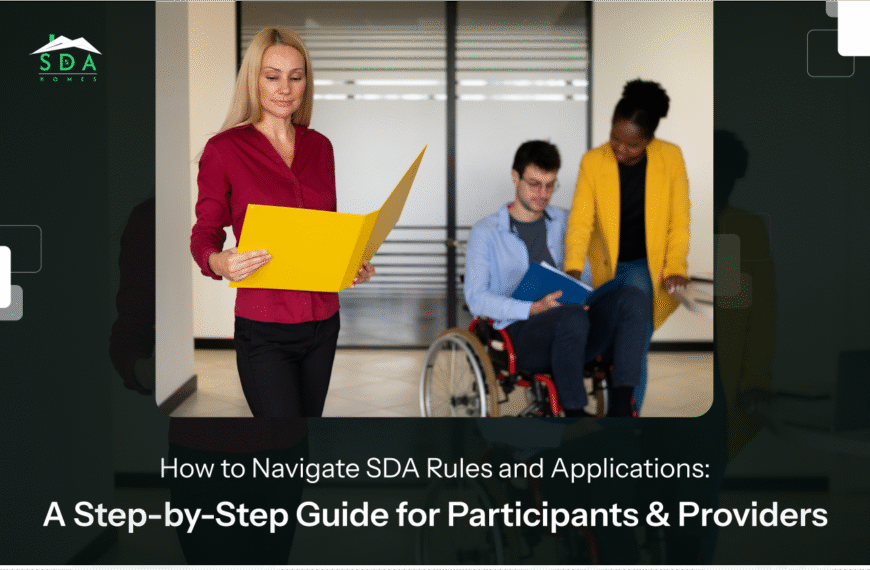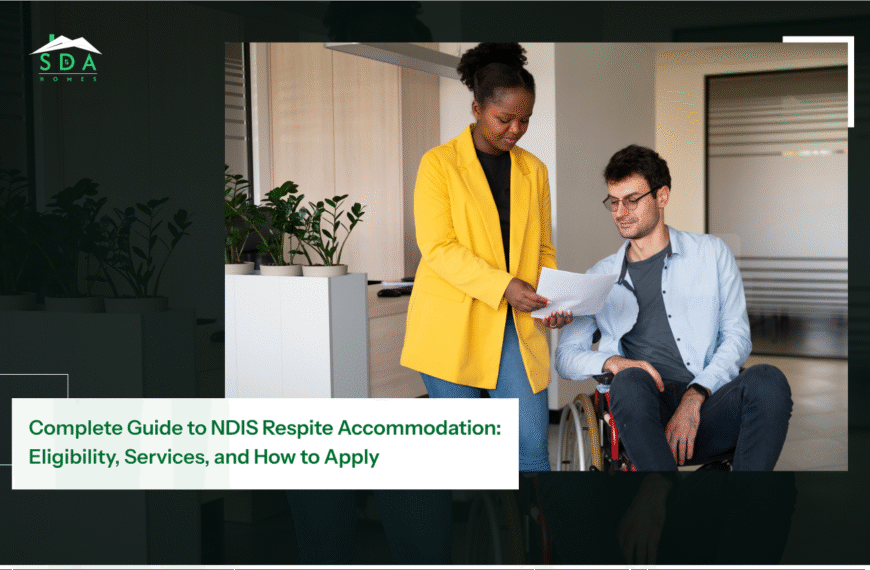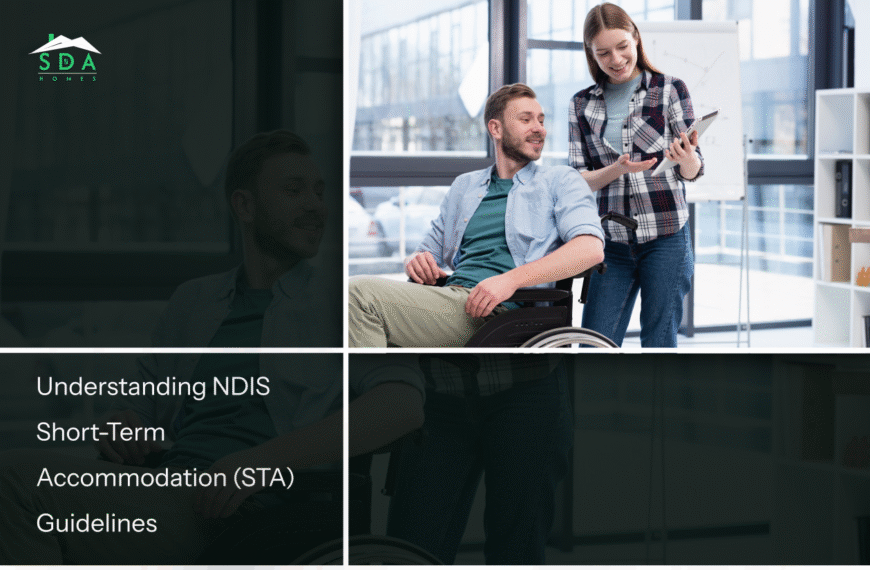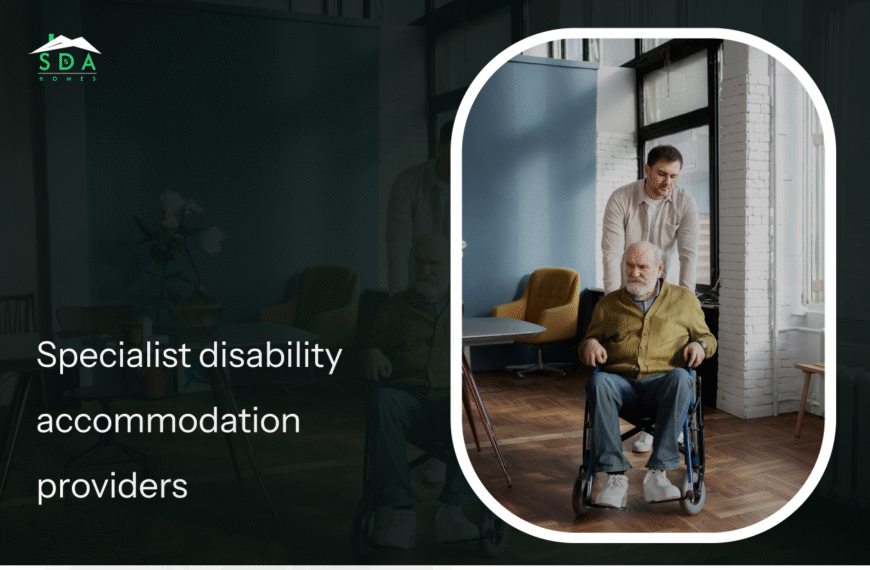NDIS Specialist Disability Accommodation
When we think about housing for people with disabilities, it’s not just about having a place to stay. It’s really about having dignity, being independent, and being able to live life on your own terms. NDIS Specialist Disability Accommodation, funded through the NDIS, makes this a reality by giving people with significant disabilities a safe, accessible, and personalized place to call home. It offers housing choices that are specifically designed for people with complex support needs, helping them live safer, more included, and more empowered lives.
This guide explains what SDA is, how it works, and how you can navigate the application process to find a home that genuinely fits your needs and enhances your quality of life.
What is NDIS Specialist Disability Accommodation (SDA)?
NDIS Specialist Disability Accommodation refers to purpose-built homes designed for individuals with extreme functional impairment or ultimate support needs. It’s not for everyone on the NDIS; it’s specifically for people who need a physical environment built from the ground up to match their disability-related needs.
Types of SDA Homes
- Specialist Disability Housing: Homes that are fully accessible, with designs that prioritize mobility and safety.
- High Support Disability Housing: Residences that include built-in features and technology for people who require 24/7 assistance.
- Customised Disability Homes: Highly individualized builds tailored to complex or unique needs.
- Shared SDA Accommodation: Homes where residents can live with others who have similar needs, fostering a sense of community alongside support services.
The funding for SDA is separate from your support services. The NDIS provides funding to offset housing costs, reducing the financial pressure so you can focus on living your life, not worrying about rent.
How SDA Protects Participants’ Rights
- Right to Safety and Security: Homes are structurally safe and tailored to prevent risks.
- Right to Independence: Layouts and assistive technology enable residents to manage more of their own lives.
- Right to Choice and Control: Participants can choose location, providers, and community proximity.
How SDA Improves Living Standards
Living standards improve dramatically when housing is designed for residents, not in a different way.
Major Life Standard Improvements:
- Physical accessibility: Wide hallway, step-free entrance, wheelchair -friendly kitchen.
- Assistant Technology Integration: Smart Home System, Medical Alert System, Voice-Primant Utilities.
- Inclusive residential alternatives: Home near shops, transport, and community hubs.
- Social inclusion: Possibility of community participation, reducing isolation.
- Financial stability: NDIS housing support, the citizens are not facing the loss of access.
These components promote inclusive housing options so that participants can connect more with their local communities and enjoy more social participation.
Financially, NDIS Specialist Disability Accommodation is available due to NDIS residential support and financing of disabilities, which reduces the cost burden and causes stability.
How to Apply for SDA Funding
We know that applying for NDIS Specialist Disability Accommodation can feel confusing. That’s why we’ve broken the process down into clear, manageable steps.
- Check Your Eligibility: Speak with your NDIS planner or a support coordinator. They will help assess your support needs to determine if you meet the criteria for NDIS Specialist Disability Accommodation funding.
- Gather Evidence: You’ll need specialist reports from occupational therapists or other professionals that clearly explain why your current housing is unsuitable and what features you need.
- Plan Your Ideal Home: Think about what you want. Where would you like to live? What type of home do you need? What kind of support will you require? Being clear about your preferences will strengthen your request.
- Lodge Your Request: Submit your application as part of your NDIS plan review.
- Await a Decision: The NDIA will review your eligibility and the evidence provided to determine your funding allocation.
Finding the Right SDA Provider and Home
It’s important to remember that not every Supported Disability Accommodation (SDA) property will be the right fit for every person. When you’re choosing a provider, here are some key things to think about:
- Think About Location: Is it somewhere convenient for you, perhaps near your family, your job, or places where you need important services?
- Check if the Design Works for You: Does the layout of the property meet your needs right now, and will it likely work well for you in the future too?
- Look at the Support Services: Does the provider work well with any personal care or therapy arrangements you already have in place?
- Consider Flexibility: If your needs change down the track, can the property be adapted to meet those changes?
NDIS experts offer a supplier that offers homes and customized disabled homes that your home develops with you.
Effect of the Real Life: Stories of Success
This always seems safe when you hear from the citizens’ perspective to capture the real value of NDIS Specialist Disability Accommodation.
Case Study 1:
Tom, in his 30s, suffers from cerebral palsy. To begin with, he adjusted a regular price that was not available for wheelchairs. However, since he went to the NDIS Specialist Disability Accommodation residence, he is able to do so much independently: preparing his own food, calculating for himself, and even making recreational friends. These things were first unimaginable to him.
Case Study 2:
Meera was faced with more care than what was usual for an injured spinal patient living elsewhere due to the lack of rental options. An apartment approved under the NDIS Specialist Disability Accommodation scheme, located close to her family, really breathed new life into her social routine. It also meant she could get medical help quickly and felt much more confident.
Summary Table: Key Benefits of SDA
| Benefits | Description | Impact on Residents |
| Accessibility & Safety | Wheelchair access, assistive technology, safety systems | Greater mobility and reduced risks |
| Independence & Autonomy | Customised supports and adaptable layouts | More self-sufficiency and control over daily life |
| Social Inclusion | Homes located near shops, transport, and community hubs | Stronger social networks and reduced isolation |
| Financial Support | NDIS funding and subsidies to cover housing costs | Less financial strain and greater stability |
Final Takeaways
NDIS Specialist Disability Accommodation is about more than just a building; it’s about empowerment. It makes sure that people with significant disabilities have the same rights as everyone else to a safe, comfortable, and home that’s tailored to them. From boosting independence to helping people feel like they belong in a community, the positive changes are really life-altering.
If you or someone you know might be eligible, speak to an NDIS planner or NDIS Specialist Disability Accommodation provider today. The right home doesn’t just change your living situation; it can change your life.
FAQs
Q1: Who qualifies for NDIS Specialist Disability Accommodation?
A: Those with extreme functional impairment or very high support needs, as assessed by NDIS, and for whom regular housing isn’t suitable.
Q2: How is NDIS Specialist Disability Accommodation funded?
A: NDIS SDA is separated from support services, and finances SDA to cover the cost of housing. This reduces the cost of renting your pocket.
Q3: Can I choose an SDA supplier?
A: Yes, you can choose your SDA supplier and where you live, as long as it fits the money you have.
Q4: Does SDA SIL (supported independent life) resemble?
A: Not at all, they are quite different! NDIS Specialist Disability Accommodation is about all physical housing, while SIL focuses on the help services provided inside the house.














